How we were creating the “image of the future” together at the 20th Travelling Docudays UA
How we were creating the “image of the future” together at the 20th Travelling Docudays UA
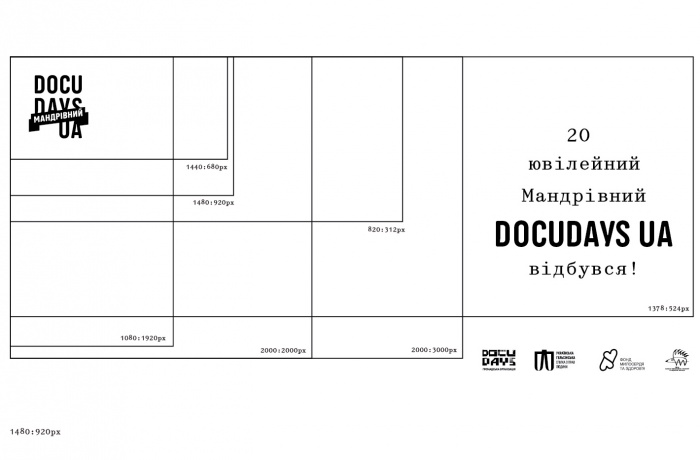
The 20th Travelling Docudays UA International Human Rights Documentary Film Festival took place despite bombings, loss of cell connection, and the capricious winter. We (co-)created it together with you over two decades, and this time was unforgettable again! We thank the team of NGO Docudays, regional coordinators, dedicated audiences, partners, donors. And most importantly, we thank the Armed Forces of Ukraine who are keeping our sky safe and defending our country, allowing us to gather together in our home cities, towns and villages.
Is this not the time to hold a festival? Is watching human rights documentaries not relevant today? The team of the Travelling Docudays UA think differently and are prepared to make an argument for it.
Our defenders are protecting Ukraine, their loved ones are waiting for their return home, help them with their love, support, daily packages with necessities, and donations. These are not some abstract people “somewhere there,” these are us. Each and every one of us is involved in Ukraine’s victory and needs a conversation about the reality around us and the planning of our future lives.
The Travelling Docudays UA brings people together, encourages them to act, helps them find like-minded people, learn about the stories of people around them and share their own stories. It is an opportunity to build a dialogue about human rights through cinema. This year, we came together to discuss and create our shared Image of the Future, which was the topic of this year’s festival. It is what we searched for and what we reflected on after watching films, participating in discussions and special events.
On 10 October, there was the first collective event, the online press conference of the Travelling Festival. The participants of the conversation included Svitlana Smal, the Executive Director of NGO Docudays; Kateryna Sinhurova, the guest coordinator of the Travelling Docudays UA; Ksenia Shymanska, the Director of the Human Rights Department of NGO Docudays; Ilona Korotitsyna, the Director of the Vgoru Media Platform who announced the special screenings of the film Kherson Unconquered; and Dmytro Hreshko, the director of the opening film King Lear: How We Looked for Love During the War.
This year, the Travelling Festival began in Poltava on 17 October with a screening of Second Wind by Maksym Lukashov. The audience immediately began discussing the protagonist Mykyta Hirnia, who was a volunteer in Chernihiv at the time and said that “he was not made for holding a weapon.” Everything changes. The argument was stopped in its tracks by one simple fact: today both the director and the protagonist of the film are defending our land in the ranks of the AFU.
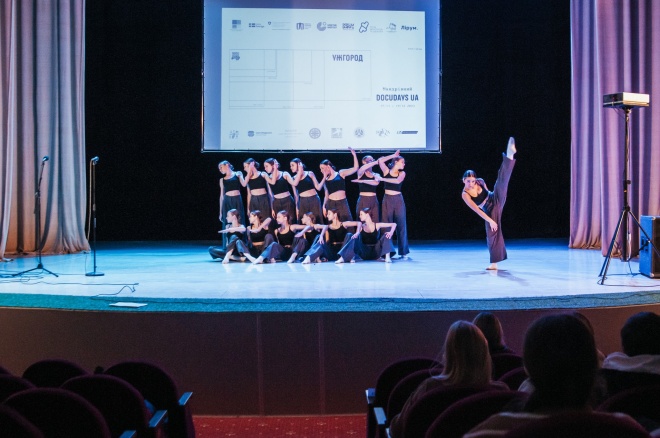
Opening of the Travelling Docudays UA in Uzhhorod
Over three months, the Festival visited cities, towns and villages in Poltavshchyna, Cherkashchyna, Kirovohradshchyna, Sumshchyna, Zhytomyrshchyna, Khersonshchyna, Vinnychyna, Ternopilshchyna, Prykarpattia, Kyivshchyna, Dnipropetrovshchyna, Khmelnychyna; it visited Lviv, Chornomorsk, Zaporizhia, Kharkiv, and Uzhhorod. Ukrainian communities in Ireland, Norway and Poland participated in the events.
The programme of this year’s Travelling Festival included 19 films from 13 countries: Ukraine, Switzerland, France, Belgium, Germany, Poland, Italy, Denmark, Czech Republic, Ireland, UK, US, Canada. 7 Ukrainian and 12 foreign films, 9 features and 10 shorts. 6 international films have roots in our context. They are Ukrainian co-productions with German, Polish, and American partners.
There were films about Ukraine’s present and history through the eyes of international artists. In particular, a perspective on the history of the Holodomor in Ukraine from the French director Guillaume Ribot, which felt very timely to the audience on the Memorial Day for the Victims of the Holodomors.
One of the films in this year’s programme was included in the Oscar shortlist in the Documentary category — it was Apolonia, Apolonia by the Danish filmmaker Lea Glob about 13 years of an artist’s life and work. Even before this news was announced, audiences in Kharkiv and Kremenchuk had an opportunity to talk to the film’s author and the protagonist online.
Several regions united and conducted a joint video conference. Three coordinators, namely Hryhoriy Kurachytskyi from Mariupol, currently based in Dnipro; Oleh Okhredko from Berdyansk, who relocated the festival to Chornomorsk this year; and Yuriy Chumak from Chuhuyiv, currently based in Cherkasy, brought their audiences together online to watch and discuss the film 89 Days together. They were joined by the film director Pavlo Dorohoi from Kharkiv. The films were traditionally screened at hubs, schools, libraries, cultural centres. Maria Symkovych in Uzhhorod, for instance, was happy to see how school children bravely asked questions during a discussion. We also thought about new formats of communication: in addition to the usual screenings, we conducted creative workshops, training sessions, city tours, photography competitions; we even implemented a small-scale concert by the documentary therapy project WARNIAKANNIA in Kremenchuk.
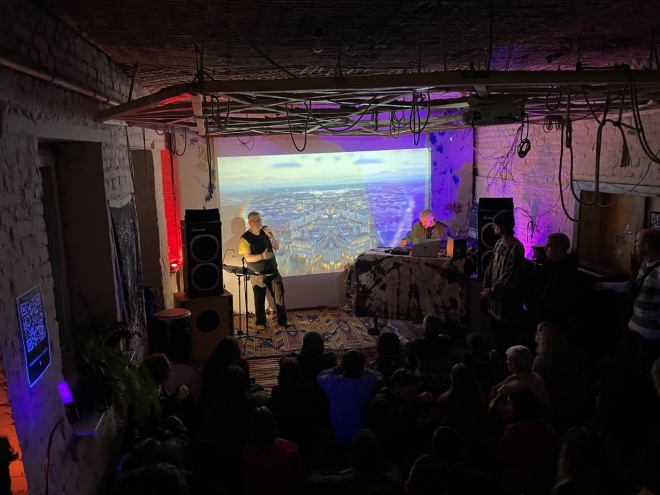
WARNIAKANNIA concert in Kremenchuk
Film directors and protagonists travelled around Ukraine (and beyond). In total, there were 58 meetings, including 35 in the format of online invitations of filmmakers and 23 offline events, full of warmth and deep conversations. The film that travelled the most actively was King Lear: How We Looked for Love During the War by Dmytro Hreshko, a film about theatre amateurs who ended up in Uzhhorod after the beginning of the full-scale invasion. The regional coordinators Maria Mendzhul and Maria Symkovych made sure that the screening took place in the same space where the play was filmed.
The displaced people who fulfilled their old dreams of becoming actors — Oleksiy Dashkovskyi, Yulia Horelkova, Olena Aliabieva, Ruslana Tymofiy, as well as their creative leaders Vyacheslav Yehorov and Oleksandr Kutsyk felt the audience’s gratitude at seven meetings. A married couple with an active civic position, Nelia and Oleksandr Rozhko from the village of Kozubivka, travelled to Poltava and Horishni Plavni, and Halyna Lavrinets, who made them the protagonists of the film Guests from Kharkiv, visited Dnipro, Kaniv, Khmilnyk and Zhmerynka. Nearly every day, we received news about the travels of the film 89 Days and its director Pavlo Dorohoi, who filmed the Kharkiv Metro and demonstrated his film personally in Dnipro, Lviv, and his home city, Kharkiv.
In-person guests at festival events were not all Ukrainian. For example, the city of Kilkenny in Ireland, where a Ukrainian community lives, was visited by the renowned documentary filmmaker Neasa Ní Chianáin, the author of Young Plato. Despite the difficult journey and icy roads, Polish filmmaker Piotr Pawlus visited the screening and discussion of his film In Ukraine in four cities: Uzhhorod, Ivano-Frankivsk, Ternopil, and Chortkiv. We are also grateful to Matt Sarnecki, an American director, for an important online conversation about his film The Killing of a Journalist.
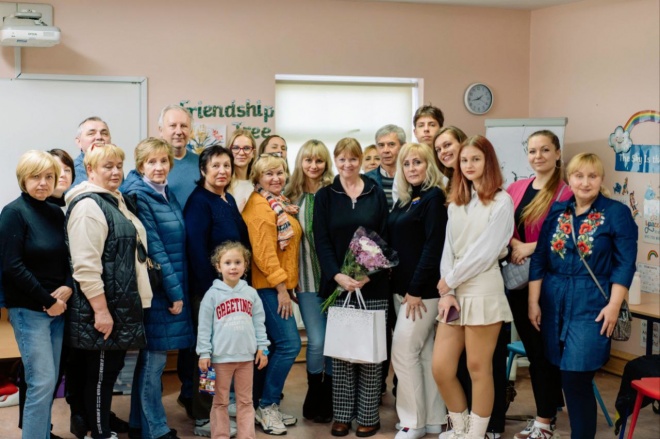
Neasa Ní Chianáin with the Ukrainian community in Ireland
Accessibility is an integral subject and practice which we consider to be important in our difficult time. For the festival, it is primarily implemented by creating films with audio descriptions, organising events in accessible spaces, and regular communication about the issues that concern people. The 20th Travelling Festival included a screening of Ptitsa by Alina Maksymenko in Poltava for people with vision impairments, an Inclusivity Day event in Kharkiv accompanied by a screening and discussion of Oasis by Justine Martin, as well as a seminar and an accessibility tour in Uzhhorod.
When we think about accessibility today, we realise that not everyone is able to join the festival by attending screenings. Which is why the films and discussions of the Travelling Festival were demonstrated and streamed in the DOCUSPACE Online Cinema: 19 film releases, a livestream with the director Matt Sarnecki about Justice Through Cinema, and three human rights discussions from RIGHTS NOW!
The special event of this year’s festival were screenings of the film Kherson Unconquered from our partners, the Vgoru Media Platform. It is a film about the work of Khersonian journalists. Since the beginning of the full-scale invasion, the publication’s reporters recorded everything that was going on in the city. Together with other Khersonians, they lived through the capture of the regional capital by russians, rallies, occupation, and the liberation of their home city. The film includes unique footage which shows what the past year and a half was like for Kherson and its residents. The Vgoru team — director Ustyn Danchuk, journalists Liza Zharkykh and Iryna Ukhvarina, and the Media Platform’s director Ilona Korotitsyna — visited Boryspil, Ivano-Frankivsk, Vyshnivets, Chortkiv, Kremenchuk, Kryvyi Rih, and Kherson twice. In six other cities and villages, we successfully created an emotional and fruitful online conversation.
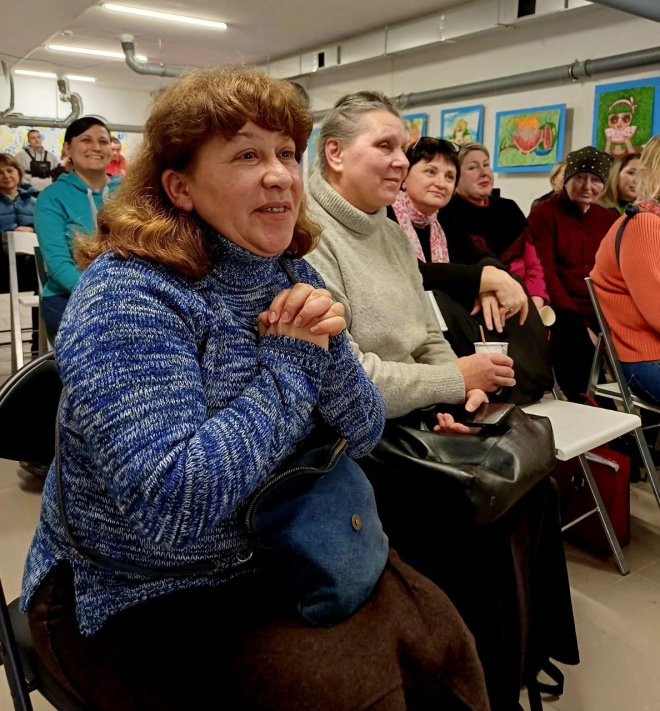
A screening of Kherson Unconquered in the city where the film events take place
In Kharkiv, the DOCU/SYNTHESIS Interdisciplinary Art Programme presented an audio installation based on a project by the Lviv Center for Urban History, Documenting the Experiences of War: Diaries and Dreams of the War. The visitors of the art space listened to personal stories of people from different corners of Ukraine.
The future is impossible without the knowledge of history, so the Festival team carried out a special project Love, Truth, and Videotapes: memories about the 20 years of the Travelling Docudays UA. It is a collection of six conversations with regional coordinators: with Viktoria Veres about the challenges of the festival abroad; with Nina Khoma about human rights and achieving justice; with Yevhenia Bardiak about how the Security Service and the authorities interfered with the Travelling Festival during Yanukovych’s presidency; with Andriy Volyk about biases and the Travelling Festival in communities; with Volodymyr Khanas about prominent figures; and with the Festival’s founders Gennady and Igor Kofmans about how the Travelling Docudays UA was born. The interviews are available on our website, and in the articles on LiRoom, a partner publication of the Festival, a media about new Ukrainian culture.
How can each of us help rebuild Ukraine? What kind of support can Ukraine expect and what should be the foundations of our country’s development? We looked for answers in the Lugano Declaration. “It is based on seven Lugano Principles,” said the president of Switzerland, Ignazio Cassis. “They define the beginning of the process of recovery, its criteria and methods.”
So what do we need to be aware of? In partnership with the RIGHTS NOW! Human Rights Programme, three discussions were organised in different Ukrainian cities: Uzhhorod, Ivano-Frankivsk, and Kremenchuk. The participants discussed the subject of Ukraine’s Recovery: How Citizens Can Influence Government Decision Making together with Oleksandr Solontay, the director of Practical Policy Programmes at the Institute for Political Education and a co-developer of the Lugano Principles, and Vitaliy Selyk, the director of CF Brave and co-founder of the volunteer initiative Brave to Rebuild. Another discussion was about Future Peace and Security: What Will the World Without “Russia” Be Like?, where the guests were Pavlo Klimkin, a Ukrainian diplomat and Ukraine’s Minister of Foreign Affairs in 2014–2019; and Serhiy Borys, the editor of the Course media. The third discussion, titled How to Start Building a Strong Country Right Now?, concerned the subjects of culture and decolonisation; the guests were the Festival’s old friends Mykola Davydiuk, a political scientist and author of the books How the Putinist Propaganda Works and How to Make Ukraine Successful; and Anton Slepakov, the leader of the band VHNVZH and one of the authors of the charity music project WARNIAKANNIA.
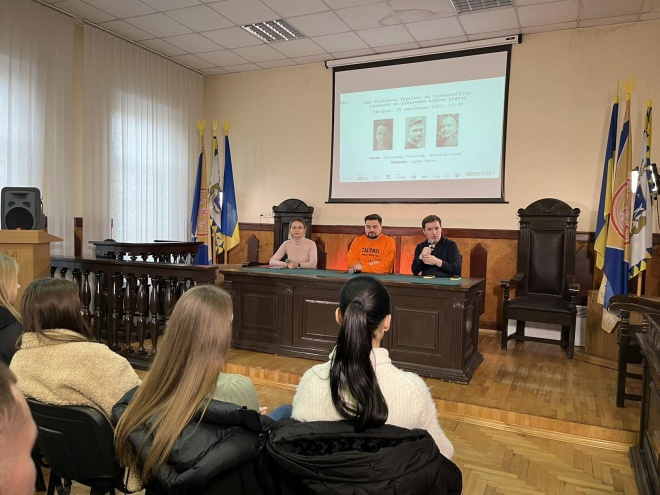
The discussion in Uzhorod on Ukraine’s Recovery: How Citizens Can Influence Government Decision Making, with Oleksandr Solontay and Vitaliy Selyk as guests
“I was in Lugano and I was one of the people who demanded that these principles are written down. I took part of the responsibility for implementing the mechanisms of engagement and inclusion. After returning to Ukraine, my team and I work every month to invite the public to discuss and plan the recovery. This year was the second part of the conference in London, and we managed to organise an accompanying meeting there which involved 60 representatives of local communities. It is a ‘manifesto of civil society’.”
Using the example of Uzhhorod, Oleksandr Solontay described the need for rebuilding even the most remote areas in Ukraine and emphasised the value of democratic participation, transparency and inclusivity as some of the principles of the Lugano Declaration.
During a conversation in Ivano-Frankivsk, the diplomat Pavlo Klimking expressed a crucial opinion about integration into the European space and why “russia’s” hostility against Ukraine will not go away:
“The mental code of the Ukrainian nation includes freedom and justice. Sometimes it’s not perfect and not the way we imagined it, but it exists. And this is our difference from russia. It also means that our border will represent a fundamental split from a different civilisation where people do not want freedom and do not want to take responsibility.”
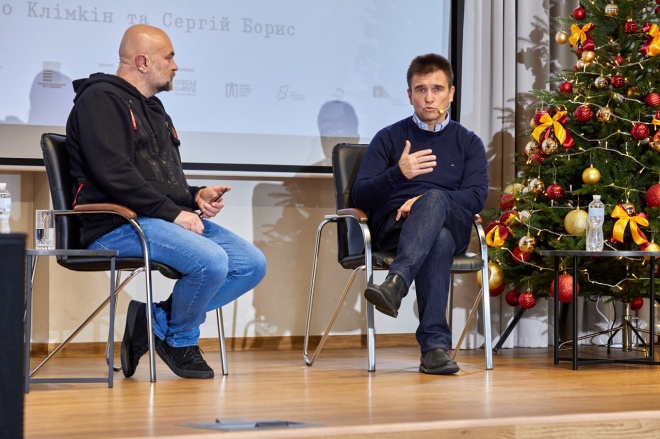
The discussion in Ivano-Frankivsk on Future Peace and Security: What Will the World Without “Russia” Be Like?, with Pavlo Klimkin and Serhiy Borys as guests
Thus, as noted by Iryna Pavliukovska, the communications director of the Human Rights Department who travelled to the discussions, “During the three events, there was a feeling that the experts were passing the baton to one another to encourage everyone to invest in the recovery of our country right now: help clear debris or rebuild houses, use the instruments of citizen influence, fight corruption at their own level, record the history of this war in films or music, and help the AFU.”
The Travelling Docudays UA concluded with a screening and discussion of Young Plato by Neasa Ní Chianáin and Declan McGrath in Ternopil on 27 December. The authors of the Irish film reflect on contemporary Belfast and the experience of trauma, which resonated with Ukrainian audiences.
In our conclusions, we must mention the people who made it possible for the 20th Travelling Docudays UA to happen at such a scale and creative ardour. We congratulate Olena Burim on the successful start of the festival in the Poltava Region, Darya Denysenko with the Travelling Festival in Chornomorsk, Nina Khoma in Lviv, Hryhoriy Kurachytskyi in Dnipro, Maria Mendzhul and Maria Symkovych in Uzhhorod, Aliona Hlazkova in Kremenchuk, Oleksandria and Horishni Plavni, Oleksandr Stepanenko in Chortkiv and Volodymyr Khanas in the Ternopil Region, Tetiana Pihurska and Andriy Volyk in Prykarpattia, Olha Leontieva and Kostiantyn Yukhymenko in Zaporizhia, Viktoria Veres in Germany and Zaporizhia, Anastasia Ploshchynska in Khmelnytskyi, Olha Solapanova in Kharkiv, Yuriy Chumak in the Cherkasy and Kharkiv Regions, Yulia Tarasenko-Balandina in the Sumy Region, Olena Mirkhaidarova, Inha Dudnik, Liudmyla Shestakova in the Kirovohrad Region, Natalia Zhebryk in Poland, Viktoria Kuzmenko in the Zhytomyr Region, Serhiy Lepiokhin in Kryvyi Rih, Olena Stariuk in Kherson Region and in Poland, Vitaliy Dorokh and Svitlana Silchenko in the Vinnytsia Region, Olena Kuznetsova in Ireland, Anastasia Kelym in Norway!
P.S.: We promise to count all the screenings and events, every audience member in January and share another article with you, The 20th Travelling Docudays UA in Numbers!
The 20th Travelling Docudays UA is held with the support of the Embassy of Sweden in Ukraine, Embassy of Switzerland in Ukraine, US Embassy in Ukraine. The opinions, conclusions or recommendations do not necessarily reflect the views of the governments, charities, or companies of these countries. Responsibility for the contents of the material lies solely on its authors.
Docudays is a non-profit NGO which implements cultural and educational projects on the intersection of cinema and human rights in Ukraine and abroad. These include the Docudays UA International Human Rights Documentary Film Festival and the Travelling Docudays UA International Human Rights Documentary Film Festival, the DOCU/CLUB Docudays UA Human Rights Media Education Film Club Network, RIGHTS NOW! Human Rights Programme, DOCUSPACE Online Cinema, DOCU/PRO Programme for the development of the Ukrainian film industry and the DOCU/CLASS Documentary Workshop, as well as the DOCU/SYNTHESIS Interdisciplinary Art Programme and the Ukraine War Archive, launched in collaboration with the INFOSCOPE initiative.












